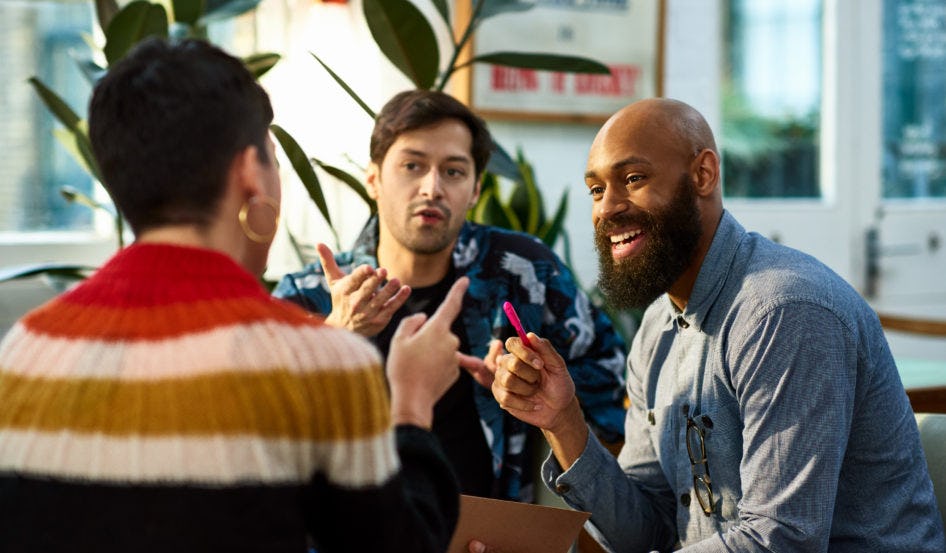
Creatives are spreading their wings and heading out of the big cities. It’s a bold move for an industry that’s always been so wedded to urban life, but hybrid working and flexspace have made it possible – and enormously fruitful too.
Creative industries have historically been city based. Close to the cool bars and the galleries, where the flat whites are good, and the air is urban. But creativity has had a bit of an image change in recent years. It’s become more inclusive. The pandemic accelerated a trend that saw many people move further away from city centres. You can be creative in the countryside now, or at the beach, or even in the suburbs.
The 15-minute commute
Thanks to movements like hybrid working and the 15-minute commute, you can now find your creative community anywhere. A survey by It’s Nice That looking into the effects of COVID-19 on the creative industries found that 70% of respondents believe it will no longer be necessary for creatives to live in major cities in the future. Also, 37% of people who took part had moved away from cities since the pandemic.
The first and most obvious reason is the rise of hybrid working. It is now perfectly normal to attend meetings by Zoom, to travel into headquarters once or twice a week, and spend the rest of your time at a flexspace closer to home. The growing concept of the 15-minute commute, in which people live no more than a quarter of an hour’s walk or cycle ride from work, or any other facilities that they regularly use, means that there is more time – not to fill with work necessarily, but just to have fun and to rest, and reawaken those creative juices.
Enjoying life
Any committed urbanite will tell you of the joy of endless socialising (and the constant feeling of fomo) that city living provides. And it is a lot of fun. But so are lots of other things that cities just can’t provide. Artist Sophie Barber goes sea swimming on her lunch break, she also rents a studio space far bigger than she could have ever afforded in a city centre. Sound designer Gaby Morse finishes her day’s work with a walk along the coast. Cheaper property prices in areas outside of big cities also help to alleviate the stress of money. Designer and director Akhila Krishnan moved from London to the seaside town of Hastings during lockdown. She said: “I wanted to not worry about money and work, to only take on the jobs that I wanted whilst being able to save.”
Life outside of the main hubs and without a long commute can be slower and healthier and that has become a priority for many people. IWG research shows that 72 percent of office workers would prefer long-term flexibility in their job to a 10 percent pay rise. It’s an opportunity for less churn and more time to think and experience – to fill your creative cup. “It [the Covid crisis] has opened a Pandora’s box and you can’t get everything back in the box again,” says IWG CEO Mark Dixon. “It’s about work being able to be done from anywhere. The laws that used to apply to business – you get a good job if you commute into the city – don’t apply anymore.”
Working from anywhere
Of course, we are painting a bucolic picture here. Many creatives need other people to bounce ideas off, and it is an industry that often requires networking. Once you move out of an established urban creative community, it takes thought and effort to create one elsewhere. Flexspace offers people the opportunity to engage that community. Well designed, fully equipped workspaces can provide the perfect environment for meetings, a productive working atmosphere (that can sometimes be lacking at home), and the technology to enable your business to stay current.
On demand membership takes that a step further – workers can mix up their offices and work as they travel, and companies can employ the very best creatives, regardless of where they happen to live. Going back to Akhila Krishnan’s wise words: “The point of a creative career isn’t simply to make creative work, it’s to find ways to make that process and that lifestyle work for you.”
The truth is, that creativity has a sort of magnetism, and as people begin to spread their wings and build new communities, others soon follow. With that comes a thriving business market that is based upon great work over anything else. That, and probably a few new artisan coffee vans too.
Read more to find out how flexspaces and hybrid working can help your creativity, your business and even your quality of life.
Share this article
 Read now Creativity was an unexpected bonus of lockdown – now we need to nurture it.
Read now Creativity was an unexpected bonus of lockdown – now we need to nurture it.
 Read now How soaring bills are changing the way we work
Read now How soaring bills are changing the way we work